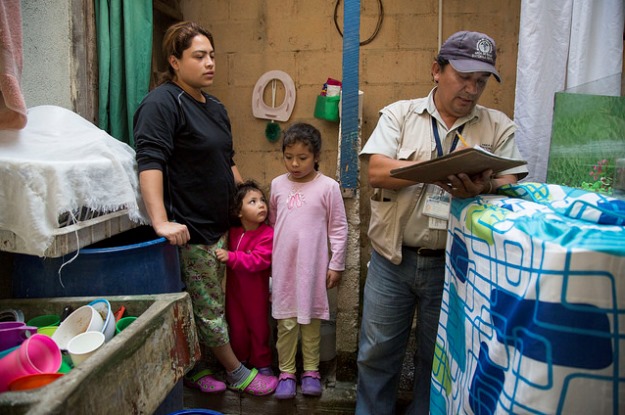The World Health Organization on Nov. 18 said that Zika no longer constituted a global health emergency. But that doesn’t mean the virus is no longer a threat. According to Giselle Carino of the International Planned Parenthood Federation/Western Hemisphere Region (IPFF/WHR), Zika is “like no other virus we have ever known” in that it is “the first mosquito-borne virus linked with birth defects or to be transmitted sexually.” Carino explained to AQ via email what the hemisphere is doing to better understand the virus and prevent its spread. This interview has been edited for clarity and length.
Americas Quarterly: Are countries in Latin America making progress in containing the Zika virus?
Giselle Carino: It’s hard to gauge the extent to which countries are making progress towards stemming the spread of the epidemic for two reasons: First, because access to testing is not available for a majority of the population. Second, since most cases of Zika are asymptomatic, the number of cases in each country is regarded to be generally low.
What we do know is that since Zika is a sexually transmitted infection, and that the Zika response has largely focused on mosquito control. When governments have addressed sexual transmission, guidance has come in the form of a mandate: don’t get pregnant. In the case of El Salvador, the government advised women not to get pregnant for two years! However, these recommendations have not been accompanied by increased investments in sexual and reproductive healthcare such as contraceptives, care during pregnancy, and safe abortion.
Are any countries taking an active role in changing legislation to address the reproductive health aspect of this?
Latin America is home to some of the strictest abortion laws in the world – 95 percent of all abortions are performed in unsafe conditions, and a handful of countries in the region outlaw abortion altogether, even when the woman’s life is at risk.
We have been advocating for the rights of women to access safe abortion services not only during the Zika epidemic, but as part of a comprehensive package of sexual and reproductive health services.
Prior to the emergence of the Zika outbreak, President Michelle Bachelet introduced legislation in Chile’s congress that would repeal the country’s total abortion ban in cases of sexual violence, fatal fetal impairments, and when the woman’s life is at risk. We have been working closely with our local partners in Chile, who have been supporting this legislation, and are hopeful that it will be approved by the Senate.
In August, our local partner in Brazil petitioned Brazil’s Supreme Court demanding the full protection of rights for women, families, and children affected by Zika. Anis–Institute of Bioethics called on the government to provide financial support and rehabilitation to all individuals with congenital Zika syndromes; launch a public education campaign on Zika; ensure access to contraception, including long-acting methods; and allow pregnant women with Zika the option to obtain safe and legal abortions.
Cuba has reportedly been successful in their ability to contain the spread of Zika. If that’s the case, are the country’s tactics replicable across the region?
I think the case of Cuba is different for a few reasons. One, the country has a strong free healthcare program that is preventative in its nature – this is unique to the rest of the region, and the United States. I also understand that they conducted mosquito controlling sprays quite early on, before the epidemic had hit. Finally, Cuba’s form of government is unlike any other in the Western Hemisphere.
What advice do you give pregnant women from countries that currently have Zika, and those that are potentially planning to travel there?
Right now, Puerto Rico is experiencing a huge epidemic – experts estimate that 25 percent of Puerto Ricans may be infected with Zika this year. In a country with summer-like weather all year round, a country where an approximate 40 percent lives in poverty, help is desperately needed to curb the spread of Zika.
The Centers for Disease Control and Prevention are constantly updating their guidance for travel and pregnancy in light of Zika, including prevention of transmission and safe sex following travel. Our partners follow best practices from the Centers and other health entities like The World Health Organization to ensure that women have the most up-to-date and accurate information.
What role does IPPF/WHR play in the fight against Zika in the Western Hemisphere?
A truly effective Zika response requires women to be informed and empowered to make decisions on their fertility, whether that means preventing pregnancy, ending pregnancy, or taking measures to prevent infection during a wanted pregnancy. It also means that men share responsibility for pregnancy prevention and sexual health; that mothers of children affected by Zika are entitled to social support for their caregiving work; and that women’s partners and the broader community have knowledge and tools to support them in these life decisions.
As the largest private provider of family planning services in Latin America and the Caribbean, IPPF/WHR is leading the regional response to Zika, drawing attention to the needs of women and girls in light of the epidemic. Our response is evolving as fast as the virus and includes key initiatives to help women affected by Zika.
—
Tummino is the senior editor of AQ and senior policy director at AS/COA, where she heads the Cuba Working Group.








